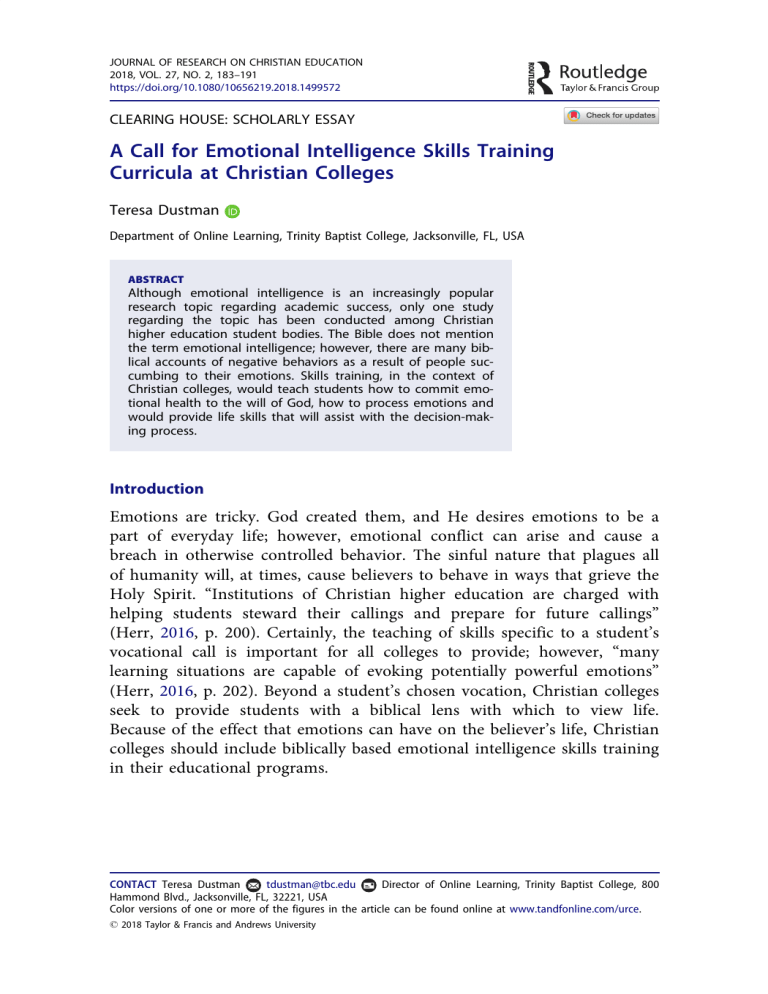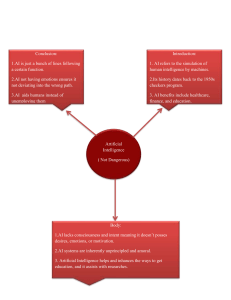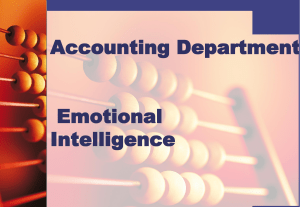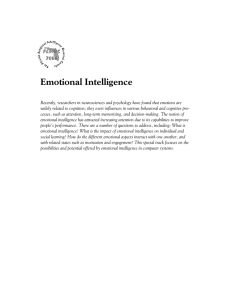A Call for Emotional Intelligence Skills Training Curricula at Christian Colleges
advertisement

JOURNAL OF RESEARCH ON CHRISTIAN EDUCATION 2018, VOL. 27, NO. 2, 183–191 https://doi.org/10.1080/10656219.2018.1499572 CLEARING HOUSE: SCHOLARLY ESSAY A Call for Emotional Intelligence Skills Training Curricula at Christian Colleges Teresa Dustman Department of Online Learning, Trinity Baptist College, Jacksonville, FL, USA ABSTRACT Although emotional intelligence is an increasingly popular research topic regarding academic success, only one study regarding the topic has been conducted among Christian higher education student bodies. The Bible does not mention the term emotional intelligence; however, there are many biblical accounts of negative behaviors as a result of people succumbing to their emotions. Skills training, in the context of Christian colleges, would teach students how to commit emotional health to the will of God, how to process emotions and would provide life skills that will assist with the decision-making process. Introduction Emotions are tricky. God created them, and He desires emotions to be a part of everyday life; however, emotional conflict can arise and cause a breach in otherwise controlled behavior. The sinful nature that plagues all of humanity will, at times, cause believers to behave in ways that grieve the Holy Spirit. “Institutions of Christian higher education are charged with helping students steward their callings and prepare for future callings” (Herr, 2016, p. 200). Certainly, the teaching of skills specific to a student’s vocational call is important for all colleges to provide; however, “many learning situations are capable of evoking potentially powerful emotions” (Herr, 2016, p. 202). Beyond a student’s chosen vocation, Christian colleges seek to provide students with a biblical lens with which to view life. Because of the effect that emotions can have on the believer’s life, Christian colleges should include biblically based emotional intelligence skills training in their educational programs. CONTACT Teresa Dustman tdustman@tbc.edu Director of Online Learning, Trinity Baptist College, 800 Hammond Blvd., Jacksonville, FL, 32221, USA Color versions of one or more of the figures in the article can be found online at www.tandfonline.com/urce. ß 2018 Taylor & Francis and Andrews University 184 T. DUSTMAN What is emotional intelligence? “Emotional intelligence essentially reflects our ability to deal successfully with other people and our own feelings” (Kar, Saha, & Mondal, 2014, p. 193). While only a “hot topic” since its 1995 popularization by Daniel Goleman, emotional intelligence is the center of many studies that show a need for teaching the skills with which it is associated (Yarrish & Law, 2009; Lloyd & Hartel, 2010; Raghavendran, 2016). Stress, worry, and anxiety are all emotions often equated with the learning process (Bryant & Malone, 2015; Beiter et al., 2015; Millett-Thompson, 2017; Baghurst & Kelley, 2014); however, when coupled with the transition from high school to college, those emotions can prove to be overwhelming. “Ignoring or giving full vent to emotions will only aggravate the problem” (Gliebe, 2012, p. 192). To avoid such aggravations, emotional skills training would be a significant addition to Christian college curricula. The definition of emotional intelligence from Salovey and Mayer (1990) is the most widely recognized: “the ability to deal with one’s own emotions and those of others to advantage in problem-solving and decision making” (p. 185). Garg and Singh (2016) posit in their research study of 400 students that emotions guide outward behaviors; the authors state that emotional intelligence “largely determines professional success” (p. 406). The five main domains of emotional intelligence are attributed to Goleman: “knowing one’s emotions, managing one’s emotions, motivating oneself, recognizing emotions in others and handling relationships” (Parkay, Anctil, & Hass, 2014, p. 264, italics added). The possession of emotional intelligence is essential beyond the classroom as well. Numerous leaders have commented on the importance of emotional intelligence for successful leadership. The publication The Business Case for Emotional Intelligence (2009) cites two distinguished, 20th-century American leaders regarding the importance of emotional intelligence (p. 2). Jack Welch, Chairman of General Electric, said, “A leader’s intelligence has to have a strong emotional component which is rarer than book smarts and actually more important in the making of a leader.” Stephen Covey, eminent author of self-help and business books said, “Research shows convincingly that emotional intelligence is more important than IQ in almost every role.” Other research notes this importance as well: “Since emotional intelligence is a set of abilities essential for the success of an individual, the purpose of imparting quality education is not possible without inculcation of emotional intelligence and its attributes” (Edannur, 2010, p. 116). Christian colleges should consider that successful educational processes would not solely focus on the cognitive skills of the traditional “3 Rs,” as they relate to a student’s chosen profession, but would JOURNAL OF RESEARCH ON CHRISTIAN EDUCATION 185 also include a biblical approach of how to manage God’s wonderful gift of emotions through emotional intelligence. What does the Bible say about emotional intelligence? God’s word often speaks of emotions (Galatians 5:16; Romans 12:2; Proverbs 29:11; Philippians 4:6). The Bible says there is “a time to weep and a time to laugh” (Ecclesiastes 3:4, KJV) and it tells of how the “Lord is near to the brokenhearted” (Psalm 34:18, KJV). It is important to remember that God created emotions; He created them to be experienced. It is also important to realize that Satan desires to circumvent God’s plans; Satan wants emotions to rule Christians (Ephesians 6:12), to cause doubt (John 8:44), and to bring about poor behavior (John 13:2). Most people would confess to remembering a time when they felt overwhelmed by emotions, or when they were witnesses to someone who allowed their emotions to cause outwardly negative behaviors. When believers want to avoid being ruled by emotions, the tendency often is to relegate the emotions to the “back burner” of life and to suppress the feelings. Mankind was created in the image of God and comprises physical, spiritual, and emotional components. Of the three components, none were meant to be ignored or given free reign. Suppressing or living with uncontrolled emotions, rather than giving them to God and learning how to be emotionally intelligent through a biblical lens, is tantamount to refusing to surrender that area of life over to Christ. Total surrender includes emotion management. The bottom line is, God created man with emotions; as a result, an understanding of how emotions can negatively affect one’s behavior and consequently one’s testimony is necessary. The explicit communication of how Satan will attempt to use emotions to thwart God’s plan in the Christian college student’s life is expedient. Satan’s lie to Eve in the Garden of Eden played to her emotional side. Unfortunately, Eve responded to the lie by doing what felt right to her at the time. Due to a lack of emotional intelligence skills, neither she nor Adam realized that the emotions they were feeling would lead them to sin. While on Earth, Jesus was fully human, and He well understood the power that emotions can wield. He felt compassion, anger, joy, and sorrow, but at no time did Christ sin as a result of His feelings. In the context of Christian college students, “A sign of maturity is being aware of one’s emotions and allowing God to rule over them; it is important to foster emotional health in college students” (Gliebe, 2012, p. 257). An additional reason to include emotional intelligence skill training in Christian colleges is that emotional intelligence parallels God’s Word. The Bible provides many specific examples of people who allowed emotions to 186 T. DUSTMAN affect the decision-making process. The emotions of sorrow, jealousy, stress, and fear caused harmful results for three men in the Bible: the rich young ruler, King Saul, and Jonah. The rich young ruler of Matthew 19 allowed his sorrow regarding the idea of giving up his many earthly possessions to interfere with his desire to follow God. Because of jealousy and other uncontrolled emotions during stressful times, King Saul eventually lost his entire kingdom. Lastly, the prophet Jonah so feared going to his enemies for the purpose of preaching the Gospel that he refused to obey God’s leading in his life. A Christian’s behavior represents a holy God, and in the book entitled Emotional Intelligence and the Church, Hayles (2016), explains how, when Christians are positively engaged with those around them, the will of God can be effectively carried out. Biblical emotional intelligence “is the godly and wise management of emotions and is a key skill in Christian living and in serving God effectively” (Edmiston, 2014, para. 6). God desires that believers experience the emotions He created, yet when emotions begin to overwhelm, the Bible is clear that praying for God’s peace is beneficial (Colossians 3:15). Because emotions are a part of God’s design, emotions are not dangerous; the danger lies in allowing emotions to cloud one’s judgment. Christ’s is the most significant example of emotionally intelligent behavior; believers who desire to model Christ will manage emotions effectively. Of course, God’s Word is clear that salvation cannot be obtained through works, good intentions, or even emotional intelligence, but Christian colleges should provide both the teaching of how to receive Christ’s gift of eternal life, as well as that of how to live a successful earthly life. What would emotional intelligence training mean for today’s Christian college student? Supporting the role of emotional intelligence training for college students, “The hope of a nation lies in the proper education of its youth” (Edanuur, 2010, p. 115). Scores of pages have been written on the proper way to provide education to students in American schools, yet based on the paucity of research concerning emotional intelligence skills training in our nation’s Christian higher education institutions, it appears that these learning institutions may not subscribe to the idea that “learning involves the whole person, the heart, emotions and mind” (Van Brummelen, 2002, p. 107). Based on a study conducted with more than 300 secondary school students, “emotional intelligence is generally low among secondary school students” (Akomolafe & Adebayo, 2014, p. 221). Because of those findings, it seems logical to conclude that the general emotional intelligence level in college students may also be inadequate. JOURNAL OF RESEARCH ON CHRISTIAN EDUCATION 187 In contrast to possessing emotional intelligence, “Students whose emotional skills are lacking will have difficulty functioning positively and will break covenant with other persons and, ultimately, with God” (Van Brummelen, 2009, p. 238). Emotional intelligence facilitates the establishment and maintenance of good interpersonal relationships (Emmanue & Thampi, 2016). That 2016 research study used a questionnaire to collect data from 500 managers serving in public enterprise in Kerala, South India and determined that emotional intelligence has “significant impacts” (p. 181) on interpersonal relationships. The study’s results also indicate that emotional intelligence skills need to be taught. Furthermore, the results of a study conducted in Isfahan, Iran, pointed to the need to teach emotional intelligence at colleges because it “will contribute to success in most endeavors” (Sasanpour, Khodabakh, & Nooryan, 2016, p. 1614). Logistically speaking, Christian colleges provide available opportunities to teach emotional intelligence skills training inside and outside of the classroom because that information can seamlessly mesh with lessons taught in Bible classes, dormitory devotions, chapel services, campus church services, Christian service outings, biblically based counseling sessions, and accountability partner sessions. In the context of other types of intelligence, “IQ [intelligence quotient] may account for only 20% of a person’s success in life; the remaining 80% depends largely on a person’s emotional intelligence” (Garg & Singh, 2016, p. 406). God’s sovereignty in a person’s life, along with one’s desire to succeed, mental and physical capabilities, and proper training, for example, certainly all play a part in how successful in life one may be, but research points to the additional need of emotional intelligence. Moreover, research indicates the need for emotional intelligence training to be added to college curricula (Garg & Singh, 2016; Saklofske, Austin, Mastoras, Beaton, & Osborne, 2012; Edaunur, 2014; Van Brummelen, 2009). Research also bears that “students’ emotional development affects their learning” (Van Brummelen, 2009, p. 237). Failing to teach students emotional intelligence skills can “considerably reduce a student’s employability” (What is employability, 2016, para. 15). These claims parallel research that posits emotional intelligence affects more than one realizes at school and in the workplace and can speak to the presence of conflict and drama within interpersonal relationships as well as on the job success (Nieuwhof, 2016). If today’s student bodies are to be tomorrow’s workforce, both secular and ministerial, then the necessity of teaching emotional intelligence to Christian college students is unmistakable. Popular culture is rampant with examples of people who became overwhelmed by emotions and therefore reaped costly ramifications. For example, the popular Christian musician, Lecrae (2011), used his experiences to write a song about anger management. In the lyrics, he states that 188 T. DUSTMAN emotions are hard to control once they escalate because an aggressive response can result. In addition to anger, other emotions can wreak explosive situations, too. For example, consider how the emotions associated with lust, pride, and worry often cause people to heed faulty thinking instead of common-sense decisions. The American Psychological Association states that the casual sexual encounters popular in today’s society can result from the portrayal by the media and entertainment industries that lustful “hookups can be emotionally enjoyable” (Garcia, Reiber, Massey, & Merriwether, 2012, p. 162). However, in reality, research proves the opposite. Furthermore, the Bible is quite clear on God’s stance against lust and the desire for sexual promiscuity (Proverbs 6:25; Galatians 5:19; Colossians 3:5; Matthew 5:28; James 1:14). “Pride can denigrate into something abhorrent and can be the motivation for antagonistic actions” (Aicinena, 2011, para. 3). Sports news media outlets frequently cover stories of hubristic athletes’ bad behavior. Finally, long-term, excessive worry can lead to mental health issues, which can cause a person to act violently, even to the point of committing murder. It is dangerous for the portrayal of negative emotions to be glamorized; today’s youth are barraged with such images without warnings of the negative impacts. Christian colleges exist to prepare students for life and career through a biblical worldview, and emotional intelligence skills are a natural extension of that preparation. The biblical approach to the management of emotions would also serve as the antithesis of the secular idea that it is ok to “do whatever feels MODEL: It stands to reason that if it is important for the Christian college student body to be emotionally intelligent, the same is true of the administration, faculty, staff, counselors, and student leaders. Emotional intelligence skills training should not be limited to the students. Colleges should ensure everyone receives the information and be careful to promote the modeling of emotionaly intelligent behavior in every area of the school. ORIENTATION: Orientations are critical since they provide students with helpful resources on how to be successful at college. While teaching students about registration, sports programs, dorm life, etc., emotional intelligence skills and their importance to college life can be shared, too. HOW TO TEACH EMOTIONAL INTELLIGENCE AT CHRISTIAN COLLEGES CHAPEL: COUNSELING: Part of the reality of campus life at many Christian colleges is the required attendance at chapel and church services. Sermons on emotional health can remind students how the Holy Spirit's desire is to help believers. That help includes how to live as proper stewards of God's gift of emotions. When dealing with students about the pressures and issues often faced in college settings, Christian college counseling centers can include the biblical perspective to emotions management. Figure 1. How to teach emotional intelligence at Christian colleges. This figure suggests how to quickly and effectively implement emotional intelligence skills training at Christian colleges. JOURNAL OF RESEARCH ON CHRISTIAN EDUCATION 189 good.” Educational and professional successes, as well as healthy relationships with God and man, are all benefits to be reaped from the addition of emotional intelligence training in today’s Christian college curricula. What are some ideas to address emotional intelligence at Christian colleges? Considering the importance of emotional intelligence training, “To him that knoweth to do good and doeth it not, to him it is sin” (James 4:17, KJV). Now that the topic of the need for emotional intelligence in colleges is becoming more prevalent in research studies, why delay imparting the skills training? While some Christian colleges may need to design or purchase complete curricula for their learning programs to best teach emotional intelligence, smaller steps can be taken, initially. Figure 1 shows four suggestions for emotional intelligence skills training. Consider how they might be quickly and effectively implemented at Christian colleges. If implementing all four at once would prove too difficult, utilizing only one or two may prove helpful until a more comprehensive plan can be instituted. Conclusion Although only one formal research study on emotional intelligence among Christian college students exists, multiple research studies among secular colleges point to the interaction between emotional intelligence and college student success. If students are to be measured by their success in school, work, and life, then the need for educating students on emotional intelligence is undeniable. Decisions that are emotionally intelligent will help minimize damage to a Christian testimony, as well as to the cause of Christ. The Bible directs that students are to be “trained in the way they should go” (Proverbs 22:6, KJV), and it is important that all students are trained to have an understanding of how to properly manage emotions. Christian colleges should be teaching emotional intelligence skills with a biblical worldview so that students will understand God’s position on how “to manage their lives, as opposed to allowing life’s circumstances to manage them” (Kanar, 2012, p. 306). ORCID Teresa Dustman http://orcid.org/0000-0002-9727-4563 References Aicinena, S. (2011). August 19). When pride goes wrong. Retrieved from https://www.printfrie ndly.com/print?disableClickToDel ¼1&disableEmail ¼1&disablePDF ¼0&disablerint 190 T. DUSTMAN ¼0&headerImageUrl¼http%3A%2F%2Fthesportjournal.org%2Fwp-content%2Fuploads% 2F2016%2F11%2Fsite-icon.png&headerTagline¼&imageDisplayStyle¼right&imagesSize¼ full-size&pfCustomCSS¼&source¼wp&url_s¼uGGC_%7E_PdN_%7E_PcS_%7E_Pc SGur FCBEGwBHEAnymBEt_%7E_PcSnEGvpyr_%7E_PcSJurA-CEvqr-tBrF-JEBAt_%7E_PcS Akomolafe, M., & Adebayo, M. (2014). Assessment of emotional intelligence among secondary school students in Ibadan Metropolis, Oyo State. Nigeria. Ife Psychology, 20 (1), 214–228. Baghurst, T., & Kelley, B. C. (2014). An examination of stress in college students over the course of a semester. Health Promotion Practice, 15(3), 438–447. doi:10.1177/ 1524839913510316 Beiter, R., Nash, R., McCrady, M., Rhoades, D., Linscomb, M., Clarahan, M., & Sammut, S. (2015). The prevalence and correlates of depression, anxiety, and stress in a sample of college students. Journal of Affective Disorders, 173, 90–96. doi:10.1016/j.jad.2014.10.054 Bryant, S. E., & Malone, T. I. (2015). An empirical study of emotional intelligence and stress in college students. Business Education and Accreditation, 7(1), 1–11. Edannur, S. (2010). Emotional intelligence of teacher educators. International Journal of Educational Science, 2(2), 115–121. doi:10.1080/09751122.2010.11889988 Edmiston, J. (2014). Biblical EQ: Wise hearts and minds. Retrieved from http://biblicaleq. com Emmanue, J., & Thampi, S. (2016). The Effects of emotional intelligence on interpersonal facilitation of managers and supervisors: Empirical findings from public sector enterprises in Kerala. Universal Journal of Management, 4(4), 180–188. doi:10.13189/ujm.2016.040403 Garcia, J., Reiber, C., Massey, S., & Merriwether, A. (2012). Sexual hookup culture: A review . Review of General Psychology, 16(2), 161–176. doi:10.1037/a0027911 Garg, S., & Singh, A. (2016). Emotional intelligence of high school students. International Journal of Education & Management, 6(3), 406–410. Gliebe, S. (2012). Strategies to foster emotional intelligence in Christian higher education. Christian Higher Education, 11(4), 253–259. doi:10.1080/15363759.2010.515482 Hayles, R. (2016). Emotional intelligence and the church. Alachua, FL: Bridge Logos. Herr, M. A. C. (2016). Emotions, transformation, and redemption: Dirkx’s “Soul Work” in Christian higher education. Christian Higher Education, 15(4), 200–214. doi:10.1080/ 15363759.2016.1186249 Kanar, C. (2012). The confident student. Stamford, CT: Cengage Learning. Kar, D., Saha, B., & Mondal, B. (2014). Measuring emotional intelligence of secondary school students in relation to gender and residence: An empirical study. American Journal of Educational Research, 2(4), 193–196. doi:10.12691/education-2-4-3 Lecrae, D. M. (2011). Anger management. On Rehab: The overdose [CD]. Atlanta, Georgia: Reach Records. Lloyd, S., & Hartel, C. (2010). Intercultural competencies for culturally diverse work teams. Journal of Managerial Psychology, 25(8), 845–875. doi:10.1108/02683941011089125 Millett-Thompson, A. (2017). Dealing with college students’ stress, anxiety, and depression. The Journal for Quality and Participation, 39(4), 24–27. Nieuwhof, C. (2016). 5 emotional intelligence hacks that can immediately improve your leadership. Retrieved from https://careynieuwhof.com/5-emotional-intelligence-hacksthat-can-immediately-improve-your-leadership/ Parkay, F., Anctil, E., & Hass, G. (2014). Curriculum leadership: Readings for developing quality educational programs (10th ed.). Boston, MA: Allyn & Bacon. JOURNAL OF RESEARCH ON CHRISTIAN EDUCATION 191 Raghavendran, B. (2016). Twin Cities schools add social-emotional learning to the 3 R’s. Star Tribune. Retrieved from http://www.startribune.com/social-emotional-learning-iscombining-with-the-3-r-s-in-twin-cities/391560651/ Saklofske, D., Austin, E., Mastoras, S., Beaton, L., & Osborne, S. (2012). Relationships of personality, affect, emotional intelligence and coping with student stress and academic success: Different patterns of associations for stress and success. Learning and Individual Differences, 22(2), 251–257. doi:10.1016/j.lindif.2011.02.010 Salovey, P., & Mayer, J. (1990). Emotional intelligence. Imagination, Cognition and Personality, 9, 185–211. Sasanpour, M., Khodabakh, M., & Nooryan, K. (2016). The relationship between emotional intelligence, happiness and mental health in students of medical sciences of Isfahan University. International Journal of Collaborative Research on Internal Medicine & Public Health, 9(4), 1614–1620. The business case for emotional intelligence (2009). Retrieved from https://www.talentsmart.com/media/uploads/pdfs/The_Business_Case_For_EQ.pdf Van Brummelen, H. (2002). Steppingstones to curriculum: A biblical path. (2nd ed.). Colorado Springs, CO: Purposeful Design Publications. Van Brummelen, H. (2009). Walking with God in the classroom (3rd ed.). Colorado Springs, CO: Purposeful Designs Publications. What is employability? (2016). April 16). Retrieved from http://www.ed.ac.uk/employabilityy/staff-information/what-why-employability-important/what-is-employability Yarrish, K., & Law, M. (2009). An Exploration on the differences in emotional intelligence of first year students examined across disciplines within the school of business in a liberal arts college. Contemporary Issues in Education Research, 2(4), 47–52. Teresa Dustman is the Director of Online Learning at Trinity Baptist College in Jacksonville, FL and a doctoral candidate at Liberty University. Her research topic is the emotional intelligence of Christian college students based on cultural heritage. Copyright of Journal of Research on Christian Education is the property of Routledge and its content may not be copied or emailed to multiple sites or posted to a listserv without the copyright holder's express written permission. However, users may print, download, or email articles for individual use.



